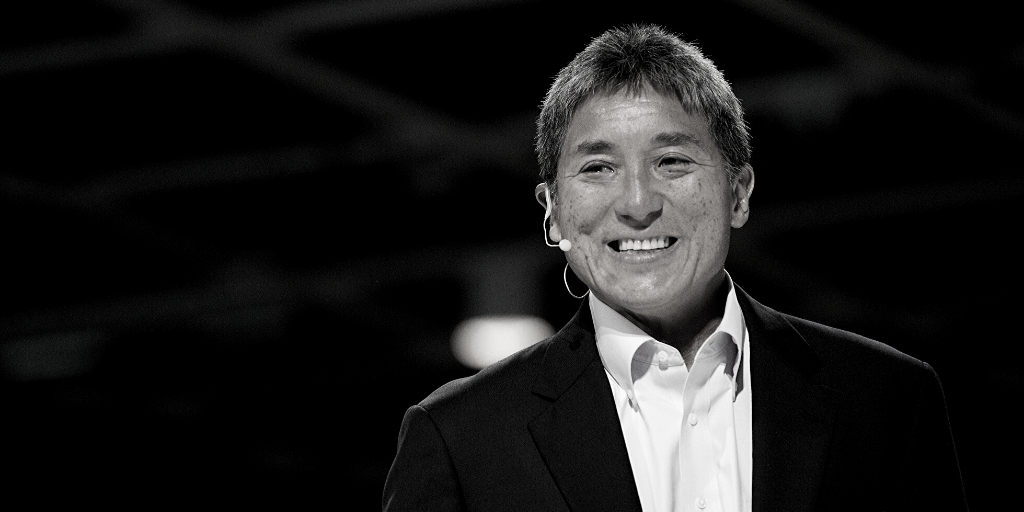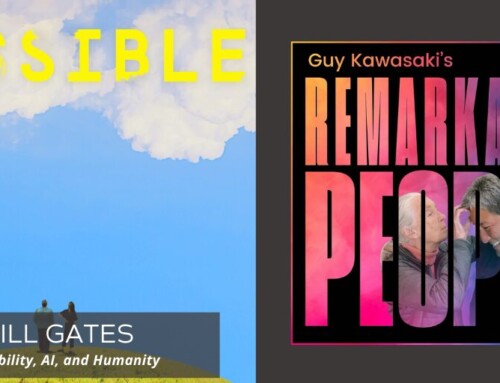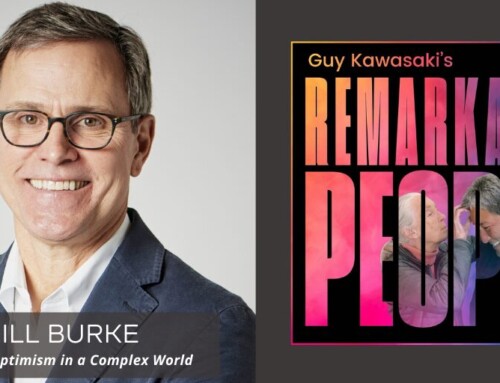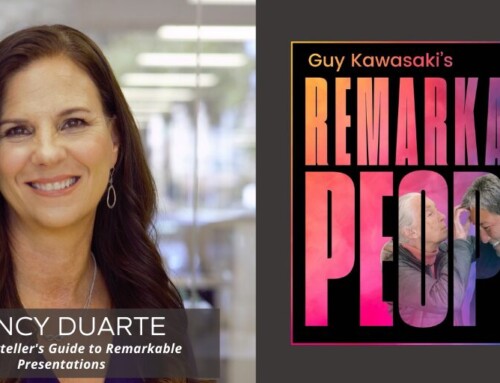This is a bonus episode of my Remarkable People podcast called The Art of Perseverance. It’s a kick in your pants mini-keynote to help entrepreneurs, small business owners, and managers figure out how to persevere during the pandemic. There won’t be any unicorns, pixie dust, or singing kumbaya while holding hands. We’re talking do or die decisions.
Buckle up and get a pep talk from Guy Kawasaki based on his experiences working at Apple when it was failing, advising companies during crises, and running his own companies in good times and harsh ones.
No one has been in this situation before. It’s more important than ever to make wise decisions.
I hope this episode of Remarkable People helps you and your business. And now, The Art of Perseverance.
Question of the week
This week’s question is:
How will you weather the storm? @GuyKawasaki shared The Art of Perseverance on his podcast this week. /the-art-of-perseverance/ 🤯 #remarkablepeople Share on X
Use the #remarkablepeople hashtag to join the conversation!
Where to subscribe: Apple Podcast | Google Podcasts
Follow Remarkable People Host, Guy Kawasaki
I hope this bonus episode will bring you some clarity and help guide you through the storm.
I’m Guy Kawasaki, and this is Remarkable People. My thanks to Jeff Sieh and Peg Fitzpatrick who are helping me get through this difficult time.
Guy Kawasaki: I'm Guy Kawasaki, and this is Remarkable People. My thanks to Jeff Sieh and Peg Fitzpatrick, who are helping me get through this difficult time. Take care, be healthy, wash your hands, and maintain a good physical distance. Until next time. This is Remarkable People.
Enter your name and email address below and I'll send you periodic updates about the podcast.
I'm Guy Kawasaki, and this is Remarkable People. This episode does not feature an interview with a remarkable person. Instead, it is a mini keynote about a specific topic: what companies can do during the pandemic to survive and thrive.
At the risk of PTSD, I mentally revisited my experiences at Apple when it was flailing and failing in the 1990s. Plus, I've had many ups and downs with companies that I've led, advised, and funded. All this said, I haven't been through anything of this severity, and I doubt that most people have.
This podcast isn't about pixie dust and unicorns. It's about making do or die decisions, grit, and courage. You can't defeat a virus with bluster, machismo, and trying harder, but you can mitigate its impact by making wise decisions. So here are my top ten tips for persevering in this pandemic.
Number one: Run the right race. This is not going to be a sprint. It's going to be a marathon. It's not a hundred yards. It's miles and miles, and months and months, perhaps even years and years. Maybe a better metaphor than a marathon is a decathlon, because a decathlon takes a large set of skills. It's not simply running. Surviving and thriving is going to take more than one skill, so put your mind in the right place. This is a marathon that requires many different skills.
Number two: Focus on cash. Cash is king, it's queen, it's prince, and princess. It's not about image. It's not about positioning and branding. It is about surviving.
Think about this: The new iPad that Apple announced a few weeks ago is now discounted on Amazon. Wrap your mind around that. When was the last time you've ever seen a new Apple product discounted on Amazon? Right now, it's all about survival. Turn your inventory into cash.
Number three: Cut deeper than you think. The rising tide floats all boats, but the falling tide affects big boats first. My experience is that people look back and regret not reacting fast enough, and not making the tough decisions. It is far better to look back and say, "I cut too much. I changed too much," than to look back and say, "I should have done more." Cut deeper than you think.
Number four: Try to do business directly with your customers. You can no longer depend on multiple tier distribution. Imagine if Amazon or your distributor decided you weren't an essential product or service. Control your distribution and fate.
Number five: Reach out to your installed base. The easiest people to sell, that is, if you have a high-quality product and you provide a good service, are the people who have already bought from you. Basically, this proves the old adage of being nice to people on the way up, because you'll see them again on the way down.
Number six: Don't depend on white knights and silver bullets, especially politicians. Magic, forgiven loans aren't going to suddenly materialize. If they do, hallelujah! Take it and run with it, but don't depend on it. A cogent business strategy is not, and then the miracle occurs.
Number seven: Be transparent with your employees. One of your most precious resources is time and energy, and lying, and then sustaining the lies requires enormous time and energy. If there was ever a time to be transparent with your staff, it is now, because everybody is suffering.
It's not like you're going to tell them something that they have not heard about other companies, other organizations, from their friends, and families, and colleagues. Now you can be transparent. That said, a leader can never have a bad day. A leader's role is to provide a calm, rational, honest, and empathetic model, even if you're faking it.
Number eight: Give to get. You're asking a lot of your employees, so give a lot, and the currency that you have is stock. Using stock options is not going to affect your cash balance. I hope you end up in a situation where you say, "I should not have given as much stock," because it means you're still alive. That's a lot better than, "The company died, but there was no ownership dilution."
Number nine: Evaluate your supply chain. Robots don't get sick. Stuff made locally doesn't need to be shipped. Maybe paying a little more is worth not being subject to the whims of trade wars, much less pandemics. Check out your supply chain and see how you can control more of it.
Number Ten: Do the stuff that you never had time to do. For example, processes and procedures; getting your ducks in a row; establishing routines; upgrading technology, and learning new skills such as video conferencing, social media, selling direct. This is the time to do the stuff that you never had time to do before.
Number Eleven: A bonus. Ask the question, "Therefore, what?" This is the most important question you could ask based on this pandemic, "What will change and what will create opportunities?" Let's go back in history a little.
Suppose that you came to the brilliant insight that people were going to have phones, these phones would have cameras, and these cameras would be able to take high quality pictures that you can share via the internet. Therefore, what? Therefore, you might create a photo sharing app like Instagram.
Now is the time for you to ask the question, "Therefore what?" Online learning; fewer face-to-face meetings; job sharing; delivery economy; gig economy; video conferencing; shortening the supply chain. All these changes may yield opportunities for you. Ask the question, "Therefore, what?" I have a great example of “therefore, what?”
There's an organization called Sweet Farm, in Half Moon Bay, and they have created a service called Goat 2 Meeting. Not go to meeting, Goat, G-O-A-T, 2 Meeting, and what this involves is enabling you to include live video from goats and llamas, and other animals on their farm to provide a bit of levity into your video conferencing.
They asked the question, "With all the video conferencing, and all the sadness, and all the stress, therefore, what could we do?" And they now let you have goats and llamas in your video conferencing.
To recap; number one, run the right race. Number two, focus on cash. Number three, cut deeper than you think. Number four, do business direct with your customers. Number five, tap your installed base. Number six, don't depend on white knights and silver bullets. Number seven, be transparent with your staff. Number eight, give to get. Use stock not cash. Number nine, evaluate your supply chain. Number Ten, do the crap you never had time to do before. Number Eleven, ask, “Therefore, what?”
I hope these recommendations and ideas can help you get through what's probably the most difficult business challenge you will ever face.
Sign up to receive email updates







great focus. Enjoyed the listen.
Thank you for the priceless advice!!! Perseverance has always proved to be great quality and now, more than ever, it is going to be pivotal to get us up and going again. Stay positive!!!